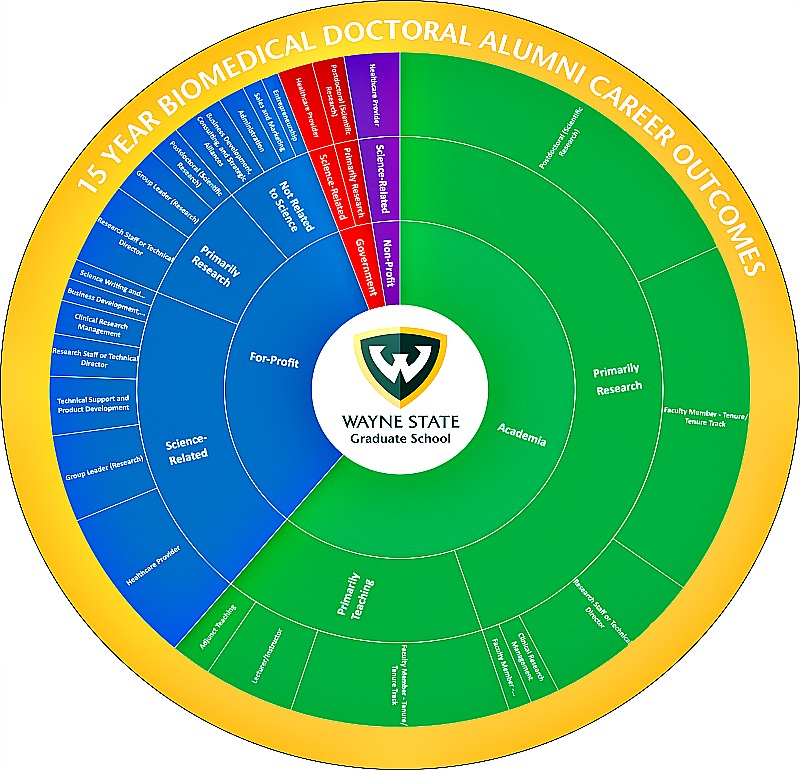A traditionally held view that biomedical doctoral students pursue careers primarily in academia as tenure-track or tenured faculty is not necessarily the case, according to a recently published Wayne State University Graduate School study in PLOS ONE.
With support from a National Institutes of Health grant, the study "Career Outcomes of Biomedical Doctoral Alumni" revealed that about 92 percent of Wayne State’s biomedical doctoral alumni are employed in careers related to research and science. This finding counters current literature arguing that the Ph.D. pipeline produces too many graduates for not only academia, but also for industry and government.
“The one-size-fits-all career trajectory does not describe this data,” said Ambika Mathur, associate provost, Graduate School dean and study lead. “It’s clear that our graduates pursue diverse jobs and move from sector to sector over the course of their careers. This has significant implications on how we train and prepare students for success in a changing economy.”
The groundbreaking study looked at how alumni progressed through careers over time. This provided for the collection of more granular data that indicate diverse career pathways over a 15-year window rather than focusing on a single snapshot.
Conceived in 2014 and launched during the summer of 2015, the study involved gathering data about career outcomes of Wayne State’s biomedical doctoral alumni who graduated between 1999 and 2014. Careers were classified into three tiers — Employment Sector, Career Types and Job Functions — and career paths were examined by gender, race, citizenship status and association with certain academic characteristics. Data were publically reported on universitywide dashboards during in fall 2015.
Another highlight of the study was the creative use of colorful visuals for data representation. Nested wheels, along with line and bar graphs, enable readers to quickly grasp key trends and understand how alumni careers change overall in different employment sectors, career types and job functions over time.

“We are excited that Wayne State is leading the way among doctoral-granting universities in providing transparent, comprehensive data on career outcomes for biomedical Ph.Ds,” said Provost and Senior Vice President for Academic Affairs Keith E. Whitfield. “This is one of the first comprehensive reports of its kind, and it demonstrates that our alumni pursue diverse career pathways and make significant contributions to the workforce in Michigan and around the country.”
Data collected during the 18-month study revealed some statistically significant differences in career paths among all demographics.
“When we drilled down into the data, we found interesting differences among our alumni,” Mathur said. “For example, women were more likely to be in teaching and providing health care; men in faculty and research; black alumni pursued careers in government at higher rates and whites in for-profit careers; and Asians and non-U.S. citizens spent more time in postdoctoral training positions than others.”
Among other findings, there was no association of academic characteristics such as GRE, GPA and Time-to-Degree completion with careers in the two largest sectors, academia and for-profit. “This debunks the myth that students with better academic profiles end up with faculty careers while ‘other’ students settle for jobs in business and industry,” Mathur said.
“We hope to spark a national conversation about the importance of collecting and reporting career outcomes for Ph.D alumni,” said Mathur. “Transparency on the part of graduate institutions helps prospective students and postdocs make informed decisions about their career paths, and it demonstrates to graduate educators that students need skills to succeed in a broad spectrum of employment sectors, not just academia.”
Other members of the research team, included Annmarie Cano, Graduate School associate dean and professor of psychology; Michael Kohl, Ph.D candidate in the political science department; Nisansala S. Muthunayake, Ph.D candidate in the chemistry department; Prassanna Vaidyanathan, Graduate School; Mary E. Wood, program director, Office of Scientific Training, Workforce Development and Diversity; and Mustafa Ziyad, Graduate School associate director of data management.
